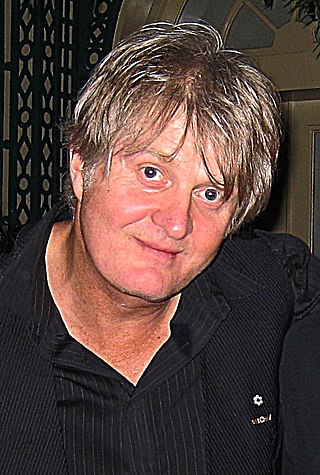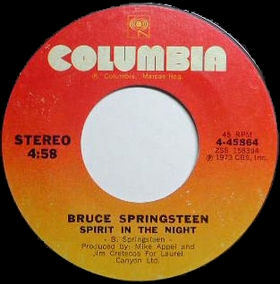Related Research Articles

Gordon Meredith Lightfoot Jr. was a Canadian singer-songwriter and guitarist who achieved international success in folk, folk-rock, and country music. Credited with helping to define the folk-pop sound of the 1960s and 1970s, he has been referred to as Canada's greatest songwriter, having several gold and multi-platinum albums and songs covered by some of the world's most renowned musical artists. Lightfoot's biographer Nicholas Jennings said, "His name is synonymous with timeless songs about trains and shipwrecks, rivers and highways, lovers and loneliness."

Bernard John Taupin is an English lyricist and visual artist. He is best known for his songwriting partnership with Elton John, recognised as one of the most successful partnerships of its kind in history. Taupin is behind the majority of John's songs, dating back to the 1960s.

Thomas William Cochrane is a Canadian singer-songwriter and musician best known as the frontman for the rock band Red Rider and for his work as a solo singer-songwriter. Cochrane has won eight Juno Awards. He is a member of the Canadian Music Hall of Fame, an officer of the Order of Canada, and has an honorary doctorate from Brandon University. In September 2009, he was inducted onto the Canadian Walk of Fame.

Burton Lorne Cummings is a Canadian musician. He is best known for leading The Guess Who during that band's most successful period from 1965 to 1975, and for a lengthy solo career.

Spirit of the West were a Canadian folk rock band from North Vancouver, active from 1983 to 2016. They were popular on the Canadian folk music scene in the 1980s before evolving a blend of hard rock, Britpop, and Celtic folk influences which made them one of Canada's most successful alternative rock acts in the 1990s.
Daniel Grafton Hill IV is a Canadian pop singer and songwriter. He had two major international hits with his songs "Sometimes When We Touch" and "Can't We Try", a duet with Vonda Shepard, as well as a number of other charting singles in Canada and the United States. He also established himself as a songwriter who produced hit songs for artists such as George Benson and Celine Dion.

Blue Rodeo is a Canadian country rock band formed in 1984 in Toronto, Ontario. They have released 16 full-length studio albums, four live recordings, one greatest hits album, and two video/DVDs, along with multiple solo albums, side projects, and collaborations.
CANO, a Canadian progressive rock band of the 1970s and 1980s, was the most successful popular musical group in Franco-Ontarian history.

John Fraser Mann was a Canadian rock musician, songwriter and actor. He was best known as the frontman of the folk rock band Spirit of the West.

"The Spirit of Radio" is a song by Canadian rock band Rush, released from their 1980 album Permanent Waves. The song's name was inspired by Toronto-based radio station CFNY-FM's slogan. It was significant in the growing popularity of the band, becoming their first top 30 single in Canada and reaching number 51 on the US Billboard Hot 100.

Star Trails is a 2004 album by Canadian band Spirit of the West. It was their first album of new material since Weights and Measures in 1997, and their first for independent label MapleMusic Recordings, but their final album of new material.

Save This House is the fourth studio album by Canadian folk rock band Spirit of the West, released on February 20, 1990, by Warner Music Canada.

Tripping Up the Stairs is the second studio album by Canadian folk rock group Spirit of the West, released in July 1986 by Stony Plain Records.

"Political" is a song written by John Mann and recorded by Canadian folk rock group Spirit of the West. One of the band's most famous songs, it originally released in 1988 as the lead single from their second studio album Labour Day. While it failed to chart as a single in 1988, it was re-recorded and released in October 1991 as the second single from their fifth studio album Go Figure, peaking at number 70 in Canada in November 1991.

Serena Lauren Ryder is a Canadian singer-songwriter. Born in Toronto, she grew up in Millbrook, Ontario. Ryder first gained national recognition with her ballad "Weak in the Knees" in 2007 and has released eight studio albums.

"We Gotta Get Out of This Place", occasionally written "We've Gotta Get Out of This Place", is a rock song written by American songwriters Barry Mann and Cynthia Weil and recorded as a 1965 hit single by English band the Animals. It has become an iconic song of its type and was immensely popular with United States Armed Forces G.I.s during the Vietnam War.

"Spirit in the Night" is a song written and originally recorded by American singer-songwriter Bruce Springsteen for his debut album Greetings from Asbury Park, N.J. (1973). It was also the second single released from the album. A cover version performed by Manfred Mann's Earth Band using the title "Spirits in the Night" was released on the album Nightingales and Bombers and as a Top 40 single.

"You Can't Stop the Music" is a song by the British rock band The Kinks. The song, appearing on the band's 1975 album Soap Opera, was written by the band's principal songwriter, Ray Davies.

Spirit Unforgettable is a 2016 Canadian documentary film, which premiered at the Hot Docs Canadian International Documentary Festival in 2016. Directed by Pete McCormack, the film profiles the Canadian folk rock band Spirit of the West in preparation for a 2015 concert at Massey Hall, as part of their farewell tour following lead singer John Mann's diagnosis with early-onset Alzheimer's disease, interspersing the story of his diagnosis and the band's preparations for the concert with a portrait of their overall history.
"Tower of Song" is a song written by Leonard Cohen that appears on his 1988 album I'm Your Man. In a 2014 reader's poll, Rolling Stone listed it as the 8th favorite Cohen song.
References
- ↑ "Songs to drink away those troubles". Calgary Herald , March 17, 2010. p. D6.
- 1 2 3 Spirit of the West’s “Home for a Rest” inducted into Canadian Songwriters Hall of Fame CFHF.ca
- ↑ Michael Barclay, Ian A.D. Jack and Jason Schneider, Have Not Been the Same: The Can-Rock Renaissance 1985-1995 . ECW Press. ISBN 978-1-55022-992-9.
- 1 2 "The making of Spirit of the West's 'Home for a Rest'" Archived March 1, 2016, at the Wayback Machine . CBC Music, April 18, 2016.
- 1 2 Home for a Rest | Canadian Songwriters Hall of Fame cshf.ca
- ↑ Save This House liner notes.
- 1 2 "Review: ‘Spirit Unforgettable’". Point of View , April 28, 2016.
- ↑ "Gold/Platinum". Music Canada . Retrieved February 7, 2019.
- ↑ "Canadian single certifications". Music Canada.
- ↑ Top 102 Canadian New Rock Songs of All Time Archived July 26, 2008, at the Wayback Machine , reposted at mog.com.
- ↑ "'We got it in the can in the can': Alan Doyle spearheads bathroom recording to benefit John Mann". CBC News Newfoundland and Labrador, January 13, 2018.
- ↑ "NIELSEN MUSIC & BILLBOARD PRESENT CANADA 150 CHARTS" (PDF). bdsradio.com. p. 30. Archived from the original (PDF) on January 2, 2020. Retrieved January 2, 2020.
- 1 2 "'Home for a Rest' voted British Columbians' favourite song by a local artist, beats 'Call Me Maybe'". CBC News British Columbia. Retrieved January 19, 2022.